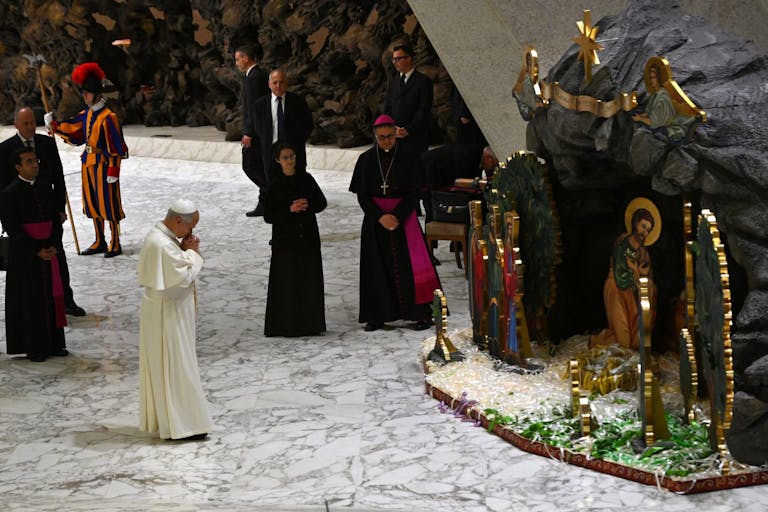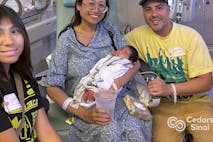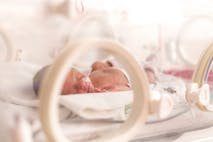
Vatican Nativity scene sends a strong pro-life message for Christmas
Angeline Tan
·
Human Interest·By Nancy Flanders
Widower fights to give his and late wife’s remaining embryo from IVF a chance to be born
A widowed father in the UK has won a legal fight to give a chance at life to a child he and his wife created through IVF before her death.
As told by The Telegraph, the 45-year-old man, known as EF, married his wife, AB, just three months after they met in their mid-20s. Three years after that, they were happy to be expecting their first child, but that baby was lost to miscarriage.
“We were devastated, but also knew this was common,” says EF. “It was only when reading her diaries later that I fully understood how hard she felt that loss.”
A few months later, they welcomed their next baby, a daughter, referred to as “X,” who was born three months premature. He explained, “She weighed just one and a half pounds and nearly didn’t make it. My wife and I took turns to watch her tiny body 24/7, all translucent skin and big, bulging eyes, willing her to live. ‘She will survive, I know it,’ she told me.
“When doctors warned that she might have some form of disability, we weren’t scared. ‘She’s our daughter, we will love her and she will be fine,’ said my wife.”
Baby X thrived and grew into a “profoundly gifted” child, but by the time she was five, the couple was struggling with what appears to have been secondary infertility. They opted for in vitro fertilization (IVF) to try for more children.
IVF set the stage for a heartbreaking legal battle
IVF is fraught with ethical dilemmas — primarily because preborn humans are destroyed at a higher rate during the IVF process than abortion. Each child created through IVF has inherent value, but many are destroyed for not meeting predetermined goals set by the fertility industry. At least a million embryos remain frozen in the United States, denied their chance at life.
AB and EF didn’t want to destroy embryos and wanted to give each child they created a chance at life. The court said that EF and the late AB are members of a religion only referred to as the “J religion,” which believes in the sanctity of life and that the soul exists from the moment of fertilization.
“In our faith we see an embryo as a precious life form,” explained EF. “So she didn’t want the use of her eggs, or our jointly created embryo, to be used for [medical] training purposes.” While she did not consent to her embryos being used in such a manner, she did consent to them being used for such training in the event of her death. The forms didn’t offer any other option in the event that she died before her embryos could be implanted.
After implanting the first embryo, they welcomed a baby girl, referred to as “Y.”
“It was the happiest day for our little family,” said EF. “Our eldest was delighted to be a big sister, and after all the stress of having a premature baby before, my wife and I now had a smiley, gargling delight – weighing 6lb! – chubby and strong.”
But that joy was short-lived.

Tragedy strikes
Two months later, AB’s mother died suddenly from a heart attack and her younger brother was diagnosed with cancer.
“We saw how short life could be and decided we must try and get pregnant with the remaining embryo soon — God willing — a third child would complete our family,” said EF. They made plans to implant that last embryo after Christmas.
Then, in a “catastrophic” event, AB and daughter Y, age 11 months, were killed.
“Half my family… just gone,” said EF. His surviving daughter, X, was just eight years old.
Father and daughter got through the dark time with support from their extended family, and after a few years had gone by, he received a phone call from the fertility clinic. He “was told of their option to destroy the embryo, unless I do something with it.”
“That visit made me realise that the very best way to honour my smart, amazing wife was to live as she would have. I made the decision to have the child she wanted,” he said.
Article continues below
Dear Reader,
In 2026, Live Action is heading straight where the battle is fiercest: college campuses.
We have a bold initiative to establish 100 Live Action campus chapters within the next year, and your partnership will make it a success!
Your support today will help train and equip young leaders, bring Live Action’s educational content into academic environments, host on-campus events and debates, and empower students to challenge the pro-abortion status quo with truth and compassion.
Invest in pro-life grassroots outreach and cultural formation with your DOUBLED year-end gift!
“I couldn’t just let it perish. I believe that every living being has a soul – which enters the embryo at the point of conception. I had the means and the capacity to provide a loving home, and I had to do everything to make that life possible. However unusual that might seem.”
So he applied to get legal permission to have the embryo implanted into the womb of a woman willing to serve as a surrogate.
Though the Human Fertilisation and Embryology Authority opposed his application, a judge ruled that she “fully supports the conclusion that AB wanted to use their remaining embryo to have a third child.” It’s an odd statement that denies the humanity of the embryo, who is fully human and is already the couple’s child, but ultimately the judge acknowledged that EF’s child could have the chance at life that he or she deserved.
Seeking a surrogate
With permission from the judge, EF began seeking a surrogate. Commercial surrogacy is illegal in the UK, “rightly to protect against women being exploited,” said EF. This meant he had to find someone willing to carry his baby without payment.
“…[W]ithout any family or friends being medically able to help, I now have to rely on an altruistic surrogate to step forward, who I cannot solicit. And then they would have to be suitable. And statistically, there’s a high chance the embryo wouldn’t implant. It’s a huge ask of anyone,” he said.
While his daughter X has said she wants her younger sibling in her life, and many of AB’s family members also support his quest for a surrogate, his mother has concerns. “She asked me, is this just driven by grief for my dead wife?” said EF.
“Of course I’ve asked myself, ‘Is it selfish to bring a baby into the world without a mother?’ But it takes a village to raise a child, and I have plenty of family love and practical support, and friends who all step in at times when my daughter needs a woman, not her dad,” he said.
EF added that, even if the embryo doesn’t survive, he needs to know he gave his child a chance at life and tried to give X her sibling.
“In life, I’ve come to believe that you’re only responsible for your actions – not the outcome. I need to sleep at night knowing I’ve done the right thing in my heart.”
The court compared EF’s case to one that centered on a collection of sperm from Israeli Defense Force soldiers killed at war. The IDF has been offering families the use of post-mortem sperm to create babies. These men had no idea before their deaths that their sperm might be taken to create children who would never know their fathers. But EF’s situation is different, as his child already exists and was created with his wife with the full intention of raising their baby together before her tragic death.
Ethical concerns of IVF and surrogacy
Regardless, surrogacy comes with its own ethical concerns in addition to those surrounding IVF. There are significant risks for both mother and child, and studies show that taking babies from their birth mothers, whether they are biologicallly related or not, can permanently alter a child’s adult brain function later in life; it can cause trauma.
While adoption seeks to heal a trauma from the separation of a birth parent, surrogacy is a trauma because it intentionally creates a child with the intent and goal of separating a baby from her birth mother.
EF, who knows that his embryo is his child, faces a heartbreaking situation, and his child’s story is a prime example of why IVF and all methods of artificial reproductive technology (ART) come at a great ethical and moral cost.
With ART and IVF, the adults are the clients, and are creating children to fit their own wants and desires. The children in such a situation are the ones who ultimately suffer the most. EF’s baby, should he or she survive, will have been one of the lucky ones to receive a chance at life, but will ultimately grow up without a biological mother or a birth mother (the surrogate).
Despite the ethical concerns of IVF and surrogacy, at this point, EF’s child already exists, and a surrogate is the only chance at life for his and his late wife’s youngest child. Once children are created through IVF, they exist, and destroying even one of them would be a tragedy.
Tell President Trump, RFK, Jr., Elon, and Vivek: Stop killing America’s future.
Defund Planned Parenthood NOW!
Live Action News is pro-life news and commentary from a pro-life perspective.
Contact editor@liveaction.org for questions, corrections, or if you are seeking permission to reprint any Live Action News content.
Guest Articles: To submit a guest article to Live Action News, email editor@liveaction.org with an attached Word document of 800-1000 words. Please also attach any photos relevant to your submission if applicable. If your submission is accepted for publication, you will be notified within three weeks. Guest articles are not compensated (see our Open License Agreement). Thank you for your interest in Live Action News!

Angeline Tan
·
Human Interest
Angeline Tan
·
Human Interest
Bridget Sielicki
·
Human Interest
Nancy Flanders
·
Human Interest
Nancy Flanders
·
Human Interest
Nancy Flanders
·
Issues
Nancy Flanders
·
Human Interest
Nancy Flanders
·
Investigative
Nancy Flanders
·
Pop Culture
Nancy Flanders
·
Human Interest
Nancy Flanders
·